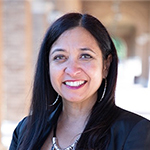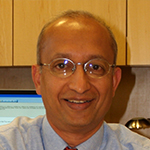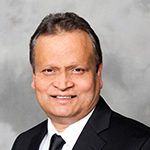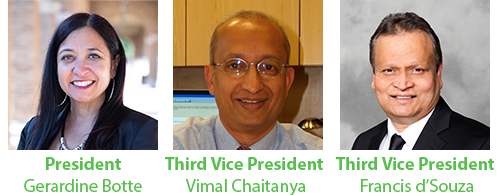The following are the biographies and statements of the candidates nominated for the annual ECS officers’ election, which takes place from January 15 through March 15, 2023.
Candidate for President | Candidates for 3d Vice President
Candidate for President
Gerardine Botte
 Biography
Biography
Gerardine (Gerri) Botte is Professor and the Whitacre Chair in Chemical Engineering at Texas Tech University (TTU), and the Founding Director of the National Science Foundation Engineering Research Center for Advancing Sustainable and Distributed Fertilizer Production (CASFER). A visionary and recognized leader in electrochemical science and technology, she has over 24 years of experience in the fundamental understanding and development of electrochemical processes as they relate to the intersection of energy, water, and food sustainability. In 2014, she was named Fellow of The Electrochemical Society for her contributions and innovation in electrochemical processes and engineering. Prior to TTU, Dr. Botte was University Distinguished Professor (lifetime award) and Russ Professor of Chemical and Biomolecular Engineering at Ohio University, Founder and Director of the Center for Electrochemical Engineering Research, and Founder and Director of the National Science Foundation Consortium for Electrochemical Processes and Technology—an Industry University Cooperative Research Center. She has 207 publications including 61 granted patents. An entrepreneur, Dr. Botte has been involved in the commercialization of technologies, and founded and co-founded companies. She received her ME in 1998 and PhD in 2000 (under Ralph White’s direction), both in Chemical Engineering from the University of South Carolina. Prior to graduate school, Dr. Botte worked in a petrochemical plant as a process engineer involved in the production of fertilizers and polymers. Dr. Botte completed a BS in Chemical Engineering at the Universidad de Carabobo (Venezuela) in 1994.
An active ECS member since 1998, Dr. Botte has served in leadership roles including member of the Board of Directors and Executive Committee; Chair, ECS Industrial Electrochemistry and Electrochemical Engineering (IEEE) Division; and member, Interdisciplinary Science and Technology Subcommittee, Honors and Awards Committee, and ECS Fellows Award Committee. She has contributed articles to ECS Interface, organized and co-organized nine Society symposia, and co-edited the corresponding ECS Transactions volumes, among others. She started the ECS IE&EE Division Outreach Program. Its first activity took place at the 210th ECS Meeting in Cancun in 2006; since then, it has taken place 16 times with at least 847 participants at different ECS meetings.
Statement of Candidacy
One of the things that makes me most excited about electrochemical and solid state science and technology is that it is a core platform with applications in different aspects of our lives. While exciting, there is still a lag in education about what electrochemical technologies can do. I believe that ECS, the premier solid state and electrochemical science and technology society in the world, will lead a paradigm change mitigating this education gap while enabling sustainable education in the field. If elected, I will lead ECS to expand into programs that explain to different audiences the importance and fundamental principles of electrochemistry. For example, programs targeted to the next generation of scholars (STEM), industry, policy makers, and investors. We could find opportunities for all this during the biannual meetings. Outreach programs can become a continuous event in our biannual meetings to attract the next generation to electrochemical science. Such programs could include our ECS Student Chapters. Forums and sessions that discuss commercialization aspects of electrochemical-based technologies can become part of our programs and help reach out to funding agencies, policy makers, and investors. I will help facilitate joint collaborations between ECS, federal funding agencies, and industry to organize and sponsor symposia on topics regarding frontiers and opportunities for electrochemical technologies.
I am fully committed to, and supportive of, the ECS Free the Science effort. If elected, I will work with ECS and members to raise the resources to minimize the cost burden of open access. It is important to continue attracting young authors to submit their best papers to our journals and to support raising stars in electrochemical and solid state science. If elected, I will help generate resources to increase the number of awards for young authors. In addition, I think it is essential to consider dissemination of knowledge to attract the next generation and to engage industrial and policy makers. In that respect, education-based apps can play a significant role. I will seek partnerships with our members and industrial sponsors to develop such opportunities.
I applaud the ECS Diversity Statement. The symposium on diversity and inclusion at the 236th ECS Meeting in Atlanta is an example of many other initiatives that can continue. I will lead ECS to implement best practices in diversity and inclusion and seek collaboration with other professional organizations to support these efforts.
ECS is an integral part of my professional career. It is my family, where I have been accepted and welcomed since I was a student, and where I interact with many distinguished scientists from all over the world who today are my peers and friends. It is an honor to be nominated for this position and I look forward to growing the ECS family and serving all of you.
Candidates for 3d Vice President
Vimal Chaitanya
 Biography
Biography
Vimal Chaitanya is currently Professor and Director of Manufacturing Systems and Research Programs at New Mexico State University (NMSU). Previously, he served as the Vice President for Research (VPR) of NMSU for over 10 years. As VPR, he was responsible for the university’s entire research enterprise. The average yearly R&D expenditure for externally sponsored research was $142 million during his tenure. About 250 faculty and staff reported to him directly or indirectly. Prior to becoming VPR at NMSU, he founded and directed a state recognized center of excellence at the University of Central Florida (UCF) with its own faculty lines and budget. He also developed and implemented dedicated MS and PhD programs in materials science and engineering.
Dr. Chaitanya has over 40 years of experience in research, which includes corrosion, hot corrosion, oxidation, solid state device processing, chemical mechanical planarization, additive manufacturing, and the food-energy-water nexus. As a faculty member, he has mentored many undergraduate and about 30 graduate students. He received the Researcher of the Year Award five times, Teaching Award twice, UCF Leadership Award (1999), UCF Excellence in Professional Service Award (2002), and NMSU Synergy Faculty Leadership Award (2022).
As a student, Dr. Chaitanya attended his first ECS meeting in 1982 and started contributing as young faculty with his students from 1986. He has been a regular attendee and member of ECS since 1994. He served on the Education Committee, Awards and Honors Committee, and Nomination Committee, while chairing various sub-committees, notably the ECS Summer Fellowship Subcommittee. He also served as lead organizer of the General Student Poster Session for several years and as organizer of various symposia. Dr. Chaitanya served as Chair of the ECS Dielectric Science and Technology Division and a member of the ECS Board of Directors.
Statement of Candidacy
I am honored to be nominated as a candidate for the 3rd Vice President of The Electrochemical Society. If elected, I look forward to serving the interests of the Society and its members. Today, we face global challenges and opportunities in areas such as the water-energy nexus, solid state device design and fabrication, green manufacturing, material performance in harsh environments, etc. With its multiple divisions, global footprint, and talented membership, The Electrochemical Society is poised to contribute significantly. ECS has a history of shaping the future of science and scientists, and I will continue this legacy by following the footsteps of our visionary leadership and investing in it.
There is no better way to invest in the future of science and technology than to invest in students, postdocs, and young scientists. If elected, I will bring my 20 years of administrative experience, zeal for research, and enthusiasm for STEM education to bear on the success of engaging young as well as budding scientists with our “member-driven” Society. I will also work to create more opportunities for industries and industrial members to get directly involved with our academic researchers to create research and education frontiers that address critical needs. In this equation, the participation of federal funding agencies is important. If elected, I will seek to create forums for the participation of funding agencies in our meetings. I believe The Electrochemical Society can play a pioneering role in bringing all the stakeholders together to identify and resolve research challenges, develop an educated workforce, and work towards building a sustainable ecosystem.
The COVID-19 pandemic has changed our perspective and challenged the way we do business. We learned to effectively communicate with each other, teach, and even perform experimental research remotely. ECS responded to the COVID challenge by hosting online and hybrid meetings, which broke all previous records of meeting participation. Various ECS committees continued their work unhindered through online meetings and digital media. This would not have been possible without the commitment of ECS membership and dedication of ECS staff. I will work tirelessly to search for and help implement practices in the new era, which serve our needs.
I can adequately represent both wet electrochemistry and solid state sciences, having worked in both areas. I have experience working with faculty researchers from various disciplines to create opportunities and develop partnerships with industries and federal labs. I will work with all divisions, local sections, student chapters, and corporate affiliate members to develop programs and forums that can be locally disseminated to the public to bring awareness of the importance of electrochemistry and solid state science in daily life and create interest among the younger generations to pursue their education and careers in this field.
Finally, as a vice president of ECS, I will be committed to working together with all members, elected officers, and professional staff to identify and implement initiatives for the sustained growth of ECS and to enable ECS members to reach their professional goals.
Francis d’Souza
 Biography
Biography
Francis D’Souza is currently Regents Professor of Chemistry and Materials Science and Engineering at the University of North Texas (UNT) and is part of UNT’s Applied Materials and Manufacturing Processing Institute. Prior to joining UNT in 2011, he was Professor of Chemistry at Wichita State University (WSU). He received a PhD from the Indian Institute of Science, and held postdoctoral positions at the University of Houston and the Université de Bourgogne.
Dr. D’Souza’s research covers a wide area of chemistry, nanophotonics, electrochemistry, and materials science. Principal research interests include supra and nanomolecular chemistry of photosensitizer-carbon nanomaterials, advanced functional materials for light energy harvesting and photovoltaics, electrochemical and photochemical sensors and catalysts, and nanocomposite hybrid materials for energy storage and utilization. Dr. D’Souza has authored or co-authored over 475 publications, given over 400 conference talks, and edited 10 Handbooks on Carbon Nanomaterials, resulting in over 21,000 citations with a cumulative h-index of 74.
Honors and awards include Fellow of The Electrochemistry Society, Fellow of the Royal Society of Chemistry, Fulbright Specialist Scholar, ACS-DFW Section Doherty Research Award, Chemical Research Society of India Medal, UNT-Research Leadership Award, UNT-Regents Professor, UNT-Toulouse Scholar Award, GIAN Fellow of the Government of India, UNT-Distinguished Professor, Japan Society for the Promotion of Science Fellow, and WSU Excellence in Research Award.
As an active member of The Electrochemical Society since 1993, Dr. D’Souza has served ECS at a number of levels. He was a member of the ECS Board of Directors from 2004 to 2008. He previously served as Chair, Vice Chair, Secretary, and Treasurer of the ECS Nanocarbon Division and is currently a Member at Large of that division. As Chair of the ECS Nanocarbon Division, he was instrumental in establishing and securing endowment monies for the Smalley Research Award and Young Investigator Awards. He continues to serve as either Chair or member of several Society-level committees, including the Honors and Awards Committee, Meeting Subcommittee, and Fellow Subcommittee, as well as the Acheson, Bard, Callinan, Haddon, Smalley, and Wagner Award Subcommittees. To date, he has co-organized over 40 symposia for the Society’s fall and spring biannual meetings. Dr. D’Souza has also served for the last 10 years as Technical and Associate Editor of the ECS Journal of Solid State Science and Technology.
Statement of Candidacy
It is my great honor to be a candidate for the 3rd Vice President of The Electrochemical Society. Electrochemical science and technology now play a vital role in our modern life, several examples of which are in the production of renewable energy, energy storage, corrosion prevention, pollution control, sensors and biosensors, and greenhouse gas reduction, to name a few. Electrochemical science is also at the forefront to offer large-scale solutions to meet the challenges of climate change and global warming. If elected to a leadership role in ECS, my mission will be to establish stronger collaborative relationships among scientific communities, promote young scientists, help develop clean energy technologies, and bridge the gap between academia, industry, and policymakers, while also promoting equity, diversity, and inclusion at every level of the Society. I will continue to serve ECS and its members constructively, collaboratively, and respectfully, and look forward to the possibility of doing so in a higher leadership role in the future.
Voting instructions
Proceed to the electronic proxy ballot and follow these easy steps to cast your vote:
- Enter your ECS member number and password. (Your member number is under MY ACCOUNT/ECS ID when you log on to the ECS website.)
- After logging on, your electronic proxy ballot opens. Enter your vote for each office.
- If you have trouble logging on, contact customer service.
- You can only vote once.


